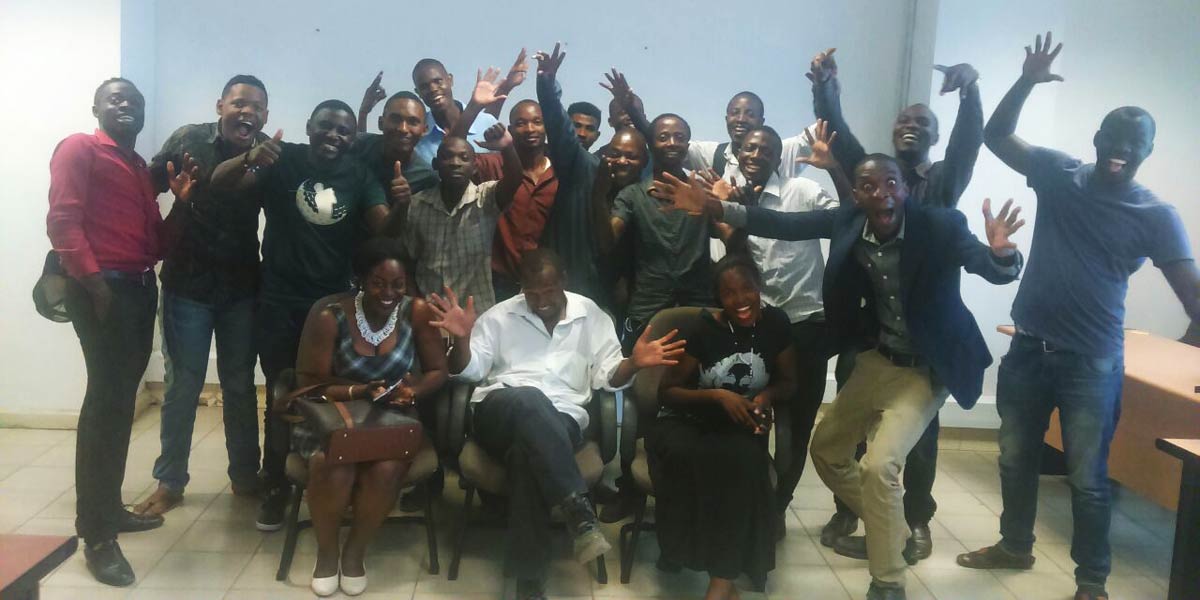Today is World AIDS Day, and here at MCC, we believe that harnessing the power of data is critical to end the fight against HIV/AIDS. More data has been created in the past two years than ever before, and technologies supporting data collection and generation are following suit. Although governments, donors, the private sector and non-governmental organizations are gradually opening up and sharing their data through increasingly sophisticated open data portals and dashboards, less than 1 percent of this data is actually used.

MCC
DCLI taps into the energy and creativity of innovators like these to empower them to use data and technology to address complex problems.
In Africa — the continent most affected by HIV/AIDS and home to half of MCC’s partner countries — more than 90 percent of the population has access to cell phones and about one-quarter has access to smartphones. Still, data literacy skills in many parts of sub-Saharan Africa lag behind, and there are few physical or virtual spaces that enable data use and promote data collaborations. Today, one of the most critical challenges for data-driven agencies like MCC and the President’s Emergency Plan for AIDS Relief (PEPFAR) is to empower and enable our country partners to use the data that is available to them to enhance their program results and advance sustainable development.
It is in this context that in April 2015, MCC and PEPFAR set out to increase country-level use of data to improve programs and policies. Through this partnership — known as the Data Collaboratives for Local Impact (DCLI) — MCC and PEPFAR are demonstrating how the data revolution can augment the impact and sustainability of U.S. Government investments while supporting partner countries’ own efforts to drive progress toward the Sustainable Development Goals (SDGs). Our vision includes, by 2018, to:
- Enable and showcase the effective uses of HIV/AIDS, global health, gender equality and economic growth data by government, citizens and other stakeholders to enhance decisions and innovation;
- Improve policy making and service delivery; and,
- Ensure citizen feedback loops are augmenting transparency and mutual accountability for results.
The DCLI model hinges on four interconnected investments that together address the root causes of insufficient and ineffective use of data by country-level stakeholders and strengthen the overall data ecosystem. At the core of the DCLI model is a data lab that convenes government, private sector and non-governmental organizations and citizens and provides them with a co-working space and resources like data, server capacity and an internet connection. The lab also provides basic data and open data training, hosts community events, and supports capacity building.
Second is an investment that identifies, supports and involves country-based youth, developers, programmers and solution providers through targeted challenge competitions that address specific programmatic challenges with data — for example, engaging with communities to lower their risk of HIV/AIDS.
The third pillar of the DCLI program is to extend the data revolution to the sub-national level by demonstrating to local government officials how they can use available data to advance local priorities, better align scarce budgets, and improve the flow of data to and from the local and national levels.
Finally, coordination with the Global Partnership for Sustainable Development Data — a worldwide network of governments, non-governmental organizations and businesses — ensures that countries’ national statistics offices, planning ministries and other national stakeholders align their work with global efforts to harness the data revolution for sustainable development.
In Tanzania, DCLI has established a data lab — locally known as dLab — that is supporting the government’s interest in using data to make better decisions and drive progress toward the SDGs. The data lab has launched online and in-person training in data literacy and open data, and training sessions have been so popular that additional trainings are being added.
Data lab activities have also sparked collaborations, including with WeRobotics, a Swiss-based startup interested in co-locating a Flying Lab at the dLab. And on World AIDS Day, the dLab is teaming up with the local Open Street Map team Ramani Huria to host a mapathon to improve free, accessible public information about HIV/AIDS in priority PEPFAR districts across Tanzania. In October, DCLI also launched its first innovation challenge to find innovative ways that data can enable access to quality healthcare and information, empower citizens, and solicit feedback from communities on service availability and quality. The effort reached more than 4,000 Tanzanian entrepreneurs and innovators, and more than 160 ideas were submitted, with 26 finalists to pitch their proposals in Dar Es Salaam this December.
Eighteen months after the founding of our partnership, the DCLI program is gaining momentum and providing valuable insights. Our model is still evolving, and capacity takes time to develop, but if interest and participation are a measure of progress, then the DCLI model has put the spotlight on the use of data and generated excitement among our stakeholders. The data revolution is not just about more data, but about developing greater capacity to use this data windfall to improve lives. This World AIDS Day, we have hope that smart and innovative uses of data will help us solve some of today’s most complex problems and move us closer to an AIDS-free generation.
For more information please visit:
Data for Local Impact Innovation Challenge or on Twitter @DLIInnovation
The U.S. President’s Emergency Plan for AIDS Relief (PEPFAR) or on Twitter at @PEPFAR

